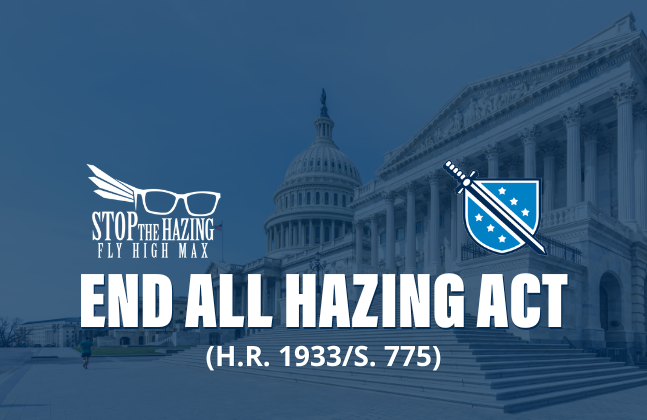On behalf of our friends at the Max Gruver Foundation, we ask Phi Delta Theta members, volunteers, friends, and families to help spread the word about the END ALL Hazing Act.
The National Study of Student Hazing found that more than 55 percent of college students involved in clubs, teams, and organizations experience hazing at colleges and universities throughout the United States. Unfortunately, hazing continues to have lethal and lasting impacts on individuals, families, and communities across the country. No state is immune to hazing or the effects in its college and university communities. Federal legislation is a necessary step in stopping hazing and the unnecessary harm it causes. If passed, this will establish mandates at nonprofit private institutions of higher education and public institutions of higher education related to hazing.
The END ALL Hazing Act requires each institution of higher education that receives federal student aid to maintain and update biannually a website page that discloses student organization violations of the institution’s code of conduct that threaten the safety of students. The report would detail the corrective measures imposed by the school on the student organization, allowing students and parents to make more informed decisions about which student organizations are safe to join.
How to Support the END ALL Hazing Act
Those wanting to join the fight against hazing can do so in several ways.
-
Email or call your senators. You can locate your senator’s contact information through www.senate.gov/senators/senators-contact.htm
- Show your support by using the hashtag #ENDALLHAZING. And don’t forget to tag your representatives in each post!
Sample Email
Media attention of hazing tends to focus on collegiate incidents, but 18 percent of Americans report being victims of hazing in high school, and it is estimated that more than 50 percent of students on sports teams and clubs in high school have been exposed to hazing behaviors.
Hazing takes many forms; this includes menial labor, disparagement, public or private humiliation, or forced exercise. The combination of alcohol or drug consumption as a form of hazing has caused bodily injury to thousands of students and is fatal in many instances.
Additionally, hazing undermines the educational experience of the victims and the perpetrators and perpetuates a cycle where students who have been hazed feel the need to haze other students as a rite of passage in joining a student organization. Research shows hazing prevention is best accomplished through comprehensive measures, including proactive education, as well as transparency and accountability for organizations that allow hazing to occur.
I believe universities and student organizations have a role to play in educating students about the dangers of hazing and how to prevent it. Still, there also is a role for policymakers to ensure there is more transparency about incidents of hazing on college campuses.
This kind of resource is critical to making sure parents and students are making informed decisions about which student organizations to join, and it could have made a difference in a number of students’ lives who unknowingly joined an organization that hazed their members.
I support and would like you to support the END ALL Hazing Act (H.R. 1933/S. 775), which stands for the Educational Notification and Disclosure of Student Actions Risking Loss of Life by Hazing Act. This legislation takes a comprehensive approach to institutional transparency and would require each public institution of higher education to publish and update a webpage twice a year detailing any student organization violations of the institution’s student code of conduct, including incidents of hazing, that pose a risk to student well-being.
Rep. Lucy McBath (D-GA) is the lead sponsor of the END ALL Hazing Act in the House and Sen. Bill Cassidy (R-LA) is the lead sponsor in the Senate.
In talking to your representative: I am asking you to sign on as a co-sponsor of the END All Hazing Act. Please reach out to Matthew Golden in Rep. McBath’s office to sign on.
In talking to your senator: We are asking you to sign on as a co-sponsor of the END All Hazing Act. Please reach out to Patrick Fox in Sen. Cassidy’s office to sign on.





